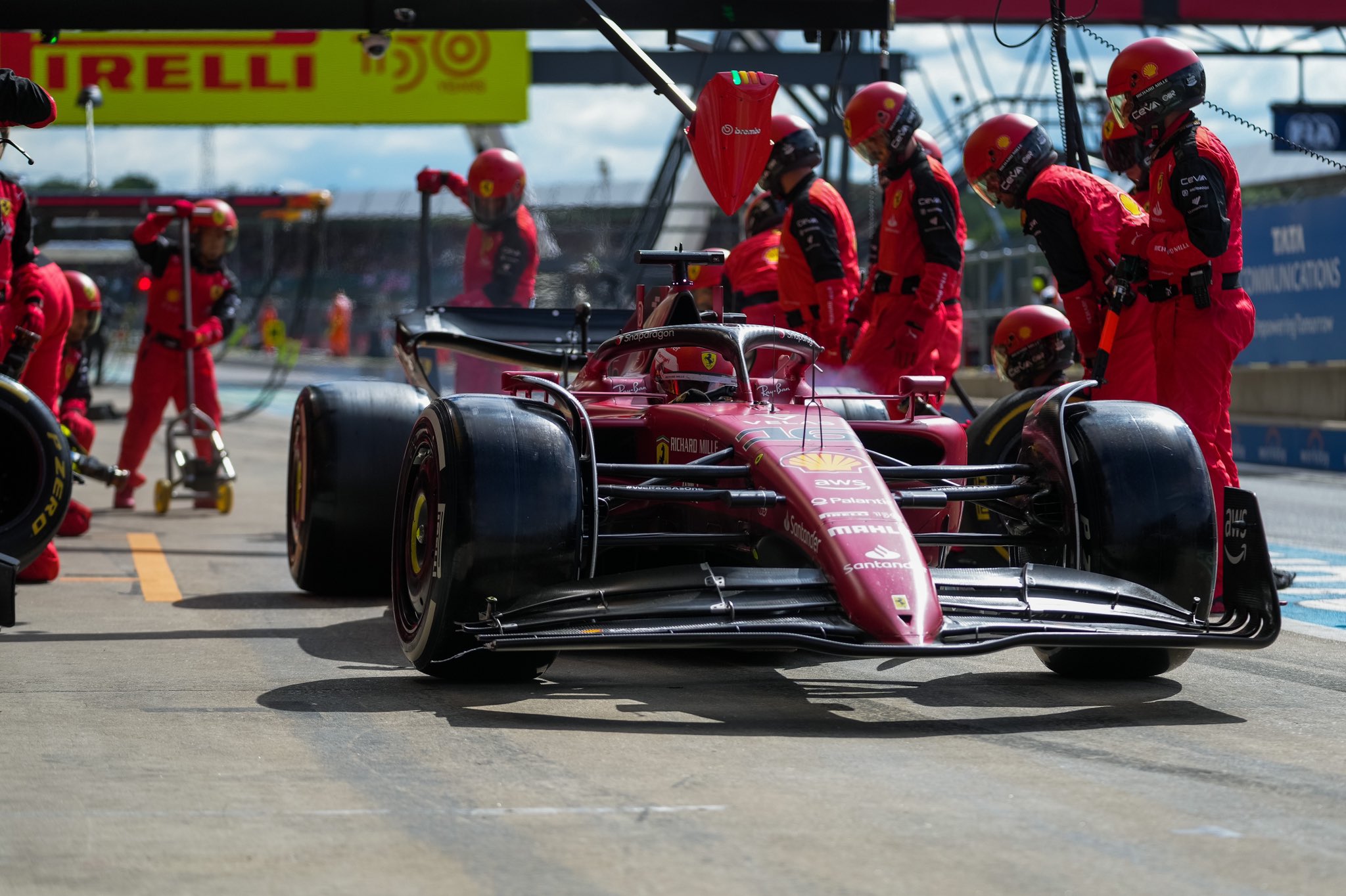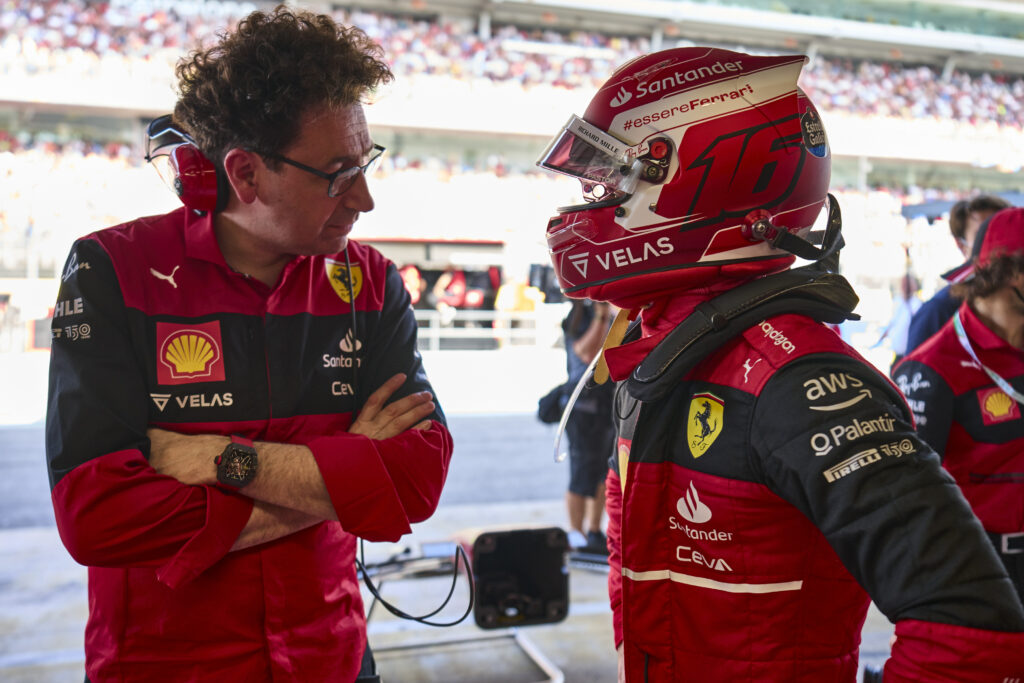The decision to end Charles Leclerc's chances of winning in England showed once again how Ferrari suffers to read races

Ferrari has once again celebrated a victory in the Formula One World Championship. Last Sunday in England, Carlos Sainz took the flag as the winner of an F1 race for the first time after 150 starts. Even more than that, the team broke a taboo that had been in place since the Australian GP in April. After that, six victories in a row by Red Bull until Silverstone changed the course of the story. But it was one of the most bitter victories imaginable for the Ferrari side. Maybe the team won't admit it - and it makes sense, so as not to water Sainz's unprecedented beer - but any fan of the Italians will admit: they missed another opportunity. If the car is good again, the old vices have appeared again: Ferrari looks like a child racing among adults.
It is possible that someone may see it as a contradiction in terms to the heavy criticism offered to the team on the back of a victory, but it is very difficult to see the logic in the choice made by the team when the heat was on at Silverstone. It gets even weirder when you look at the justifications of the boss, Mattia Binotto. Ferrari, after all, acts as if it doesn't believe it is possible to nibble the Drivers' World Championship. And so, it plays dumb, as if it didn't understand the charges regarding the decisions made about Charles Leclerc.
Since the arrival of the major updates to the cars bathed in the new F1 rules, at the Spanish GP, Leclerc had a clamorous chance of winning four races: in all of them, in the end, Ferrari shortened the chances with problems or mistakes. In the British GP, luck smiled when Max Verstappen had problems and allowed Leclerc to recover a large amount of points. Had he won, Charles would arrive in Austria with a 30-point gap and a real chance of going into the summer break with a more human handicap, for want of a better expression. A difference that would keep the title aspirations alive.
To recap: Leclerc was leading the race after a Ferrari team order ordered Sainz to give way to him - the reason was the strong pace of Lewis Hamilton, who was in danger of taking control of the race from the pair, and Sainz was slower than his teammate. Until, with 13 laps to go, Esteban Ocon had problems and stopped his car on the track. Safety-car. With 11 seconds to decide, he ordered the race leader to stay on track with his hard tires worn. Sainz came in to put on soft tires, as did Hamilton and Sergio Perez, who had pulled away in the race after having a pit-stop too soon after touching Leclerc early in the race and getting his wing damaged.

Why this decision? Ferrari's decision ensured that Sainz had a chance to win the race, while Leclerc had none left. After the restart, the obvious happened: #16 was overtaken by Sainz, Hamilton and Pérez. Victory for the Spaniard, but Charles lost 13 points as he fell from victory to fourth place. Verstappen, with his car in trouble, saved a seventh position that was worth six points. Even with problems, he only lost six points from his 49-point lead over the Monegasque.
Binotto's explanation initially was that Sainz had worn hard tires and therefore needed the soft ones more since it would not be possible to stop both cars together. Then he elaborated further.
"In a situation like that, common sense says that priority should be given to whoever is in front so that they don't lose track positions. There was nothing strange in our strategy," he assured in a statement to the Ferrari website.
"The priority was who was in front: Charles, in this case. He had newer tires, and if we had stopped Charles, our rivals would have chosen the opposite strategy and gained positions, also with newer tires. It's the same strategy they used for Lewis Hamilton in Abu Dhabi last year: he didn't come back to the pits," he recalled.
"At the same time, we opted for an opposite strategy to that with Carlos so that we wouldn't lose chances. If we hadn't done that and if we had put both cars on the same strategy, we would risk losing the race, literally handing the victory to our rivals," he finished.
Maybe Mattia Binotto doesn't remember the end of the race in Abu Dhabi right, but Mercedes' decision for Hamilton to stay on track with old tires ended up costing him the championship. I don't know if emulating this decision and then publicly basing justifications on it is the smartest option to consider.
In any case, while there may be some logic in choosing Sainz, the error is contained in another tab of this conversation. After all, only one of Ferrari's two drivers was in world title contention: Sainz distanced himself from that long ago. Leclerc was the only driver with a chance of handing the World Drivers' Cup title to Ferrari in 2022. He was, because now he is no longer. Let it be clear: Leclerc is out of the title race. Not mathematically, of course, because there are 12 more races to go. But analyzing with common sense.

Situations like the one at Silverstone don't come along all the time. Verstappen doesn't drop many points along the way unless something happens. In England, a piece of debris scattered on the track from the crash between Yuki Tsunoda and Pierre Gasly was to blame, and it stuck to and flattened the left side of the Red Bull's floor. Further problems are likely to affect Verstappen by the end of the year, but it is Ferrari that has suffered most from reliability - contrary to what the beginning of the year indicated. More than that: Leclerc will certainly be punished for engine changes between now and the end of the year, as in Canada. Probably multiple times.
Opportunities to punish the rival as a four-wheel-driver don't always come along, and they have to be seized. Red Bull manages to do this invariably whenever the opportunity knocks, but Ferrari does not.
If in Barcelona and Baku the engine betrayed Leclerc, the decisions in Monaco and England greatly favored Sainz. In Monaco, Leclerc was leading when he was stopped in the pits twice in four laps - the second time he still had to wait behind the Spaniard, something Binotto claimed was impossible to do this time. The reason? The track was dry, and the team put intermediate tires on Leclerc when everything was dry. Then, seconds later, he noticed that the track was much faster for those putting on slicks. Lost race, Leclerc from first to fourth.
Now, in England, a decision that Binotto doesn't even treat as conflicting. The logic he used is simplistic: let's stop who has the oldest tires. Without any context or evaluation of the circumstances, something that leads one to think of something else: Ferrari itself treats it as impossible to win the Drivers' World Championship.
It may even seem like an exaggeration, but evaluate it carefully. Since the disadvantage started to hit Ferrari's back, Binotto has been saying that the goal for 2022 was to compete, not to win. That it was the beginning of the rebuilding work and the like. Practically no more talk about a title is heard. And the treatment of Leclerc and Sainz as equals given the conditions is a demonstration that the title is a non-starter.
This is not a criticism of the fact that the team allowed the two to fight on the track, this is not even the point. It is good that both of them fight. The point is that the mainly strategic decisions should think Leclerc first, but this has not been the case. When in no part of the explanations Binotto offers he even mentions the subject of the title fight, the message is given: Ferrari doesn't even treat it as a valid subject anymore. Leclerc is out of the fight by distance, by conditions, and by Ferrari's own world view.

It is, also, weakness. When would Christian Horner's Red Bull and Toto Wolff's Mercedes abandon a fight like this in the middle just for fear of being defeated? Last year, as technology came to the brink and would become useless for the next year, the two teams delayed developments for the 2022 that would be just the beginning of a new era of regulation. Of course, because one races for the title, and when a small chance to knock on the door of glory appears, it needs to be pursued.
Binotto and his troupe of decision-makers show fear of defeat and thus prefer to even enter the duel. But it is even more drastic than this, because Ferrari led both championships by a wide margin after the first few races, so it was automatically in contention. Ferrari works to abandon the title race and justify afterwards that it was never in it, as if nobody else follows the championship and everything is a secret that can be put in a safe and swept out into the middle of the ocean like a bottled message to be discovered a few decades from now.
Impossible is to erase what the whole world has seen and sees now. That Ferrari has a strong package, has led the championship and has a driver driving at the highest possible level in Leclerc. That is the good side. The bad side is that it has a weak, omitted command that is desperate at the possibility of crashing wheels with Red Bull.
And weakness definitely does not win championships. Too bad for Leclerc.